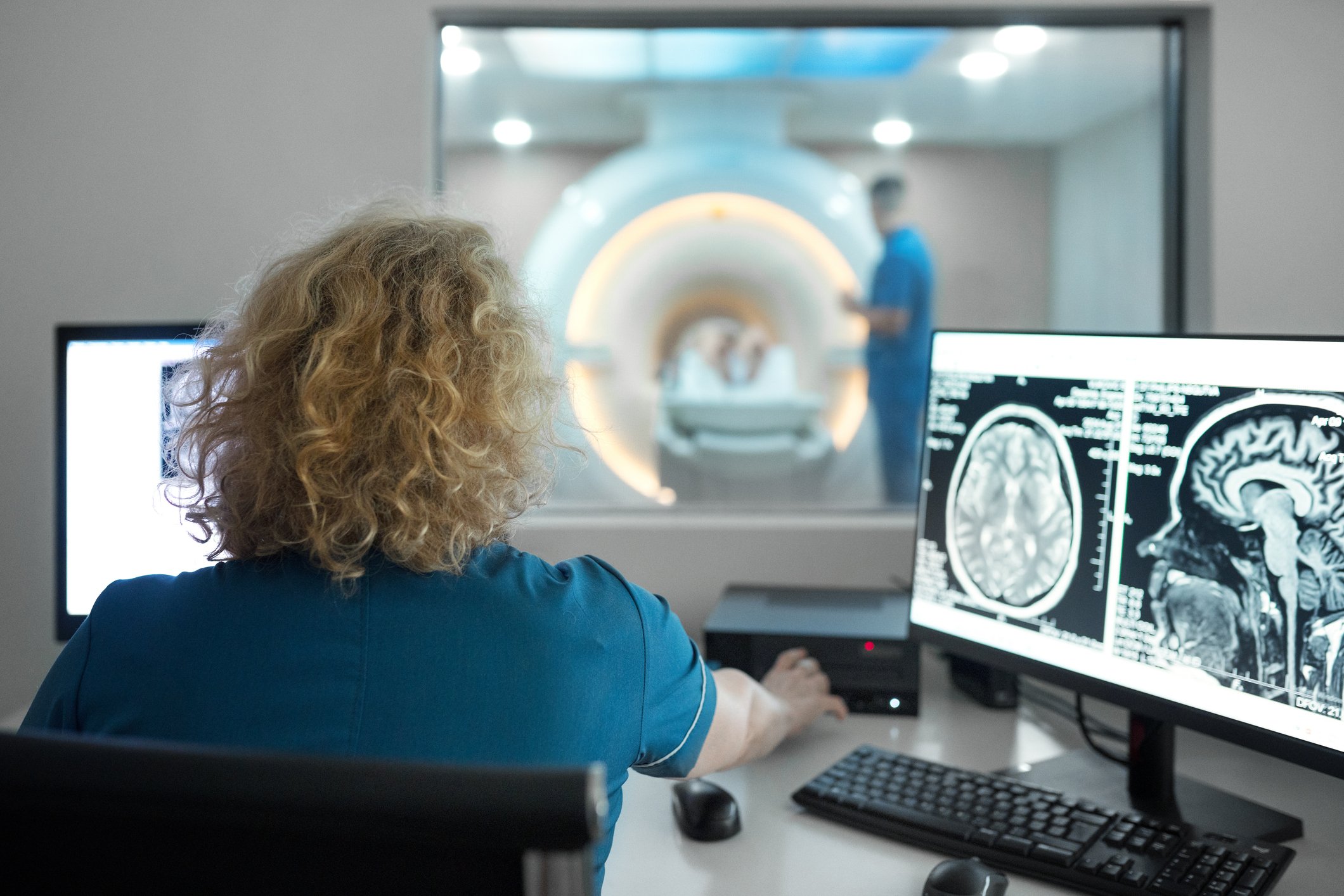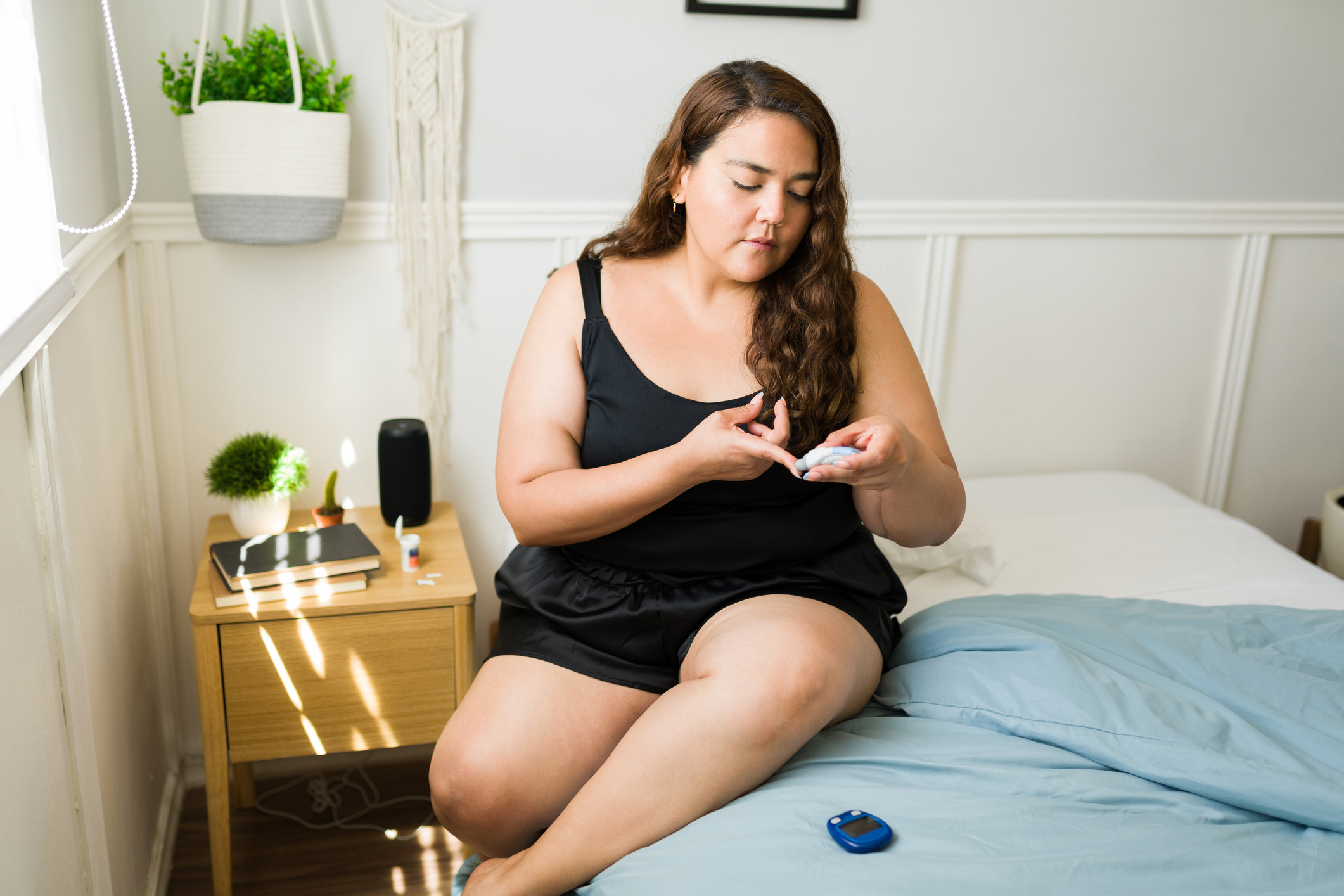A team led by the neurologist and psychiatrist Prim. Univ.-Doz. Dr. Udo Zifko conducted a case series at the neurological Post-Covid Outpatient Clinic headed by him. In patients suffering from cognitive deficits, consistent treatment with highly concentrated, standardized Ginkgo biloba led to significant symptom relief.
Up to one-third of Covid 19 sufferers experience late symptoms, most of which are neurological in nature in addition to fatigue. These include cognitive symptoms lasting longer than three months after infection, such as memory loss or concentration problems (“brain fog”). To date, there is little scientific evidence on the treatment of post-Covid/long-Covid symptoms. However, treatment with the special ginkgo extract EGb 761® is a promising therapeutic option, as recent data show (Tab. 1) [1,2].
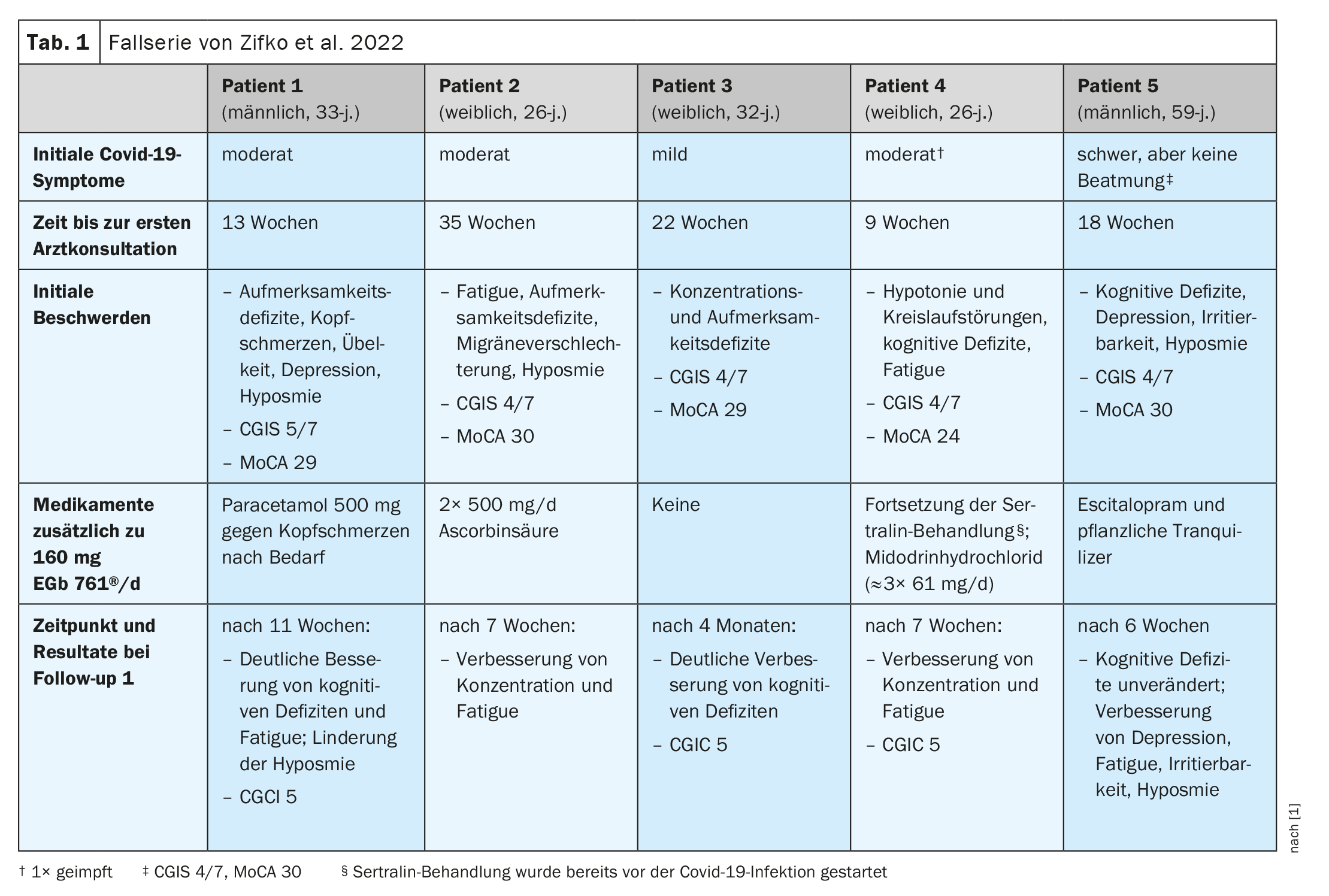
Case 1: 33-year-old man
The skilled worker became infected with SARS-CoV-2 in late March 2021 and showed moderate disease progression. He had not been vaccinated at the time of infection [1].
Symptomatology: On July 2, 2021, he visited the outpatient clinic because of attention deficits in addition to shortness of breath, which occurred about eight weeks after the first positive PCR test. In the Severity of Illness subscale of the Clinical Global Impression (CGIS) test, the score was 5/7. The patient suffered from 3-4× weekly headaches with nausea, fatigue, and depressed mood. Pre-existing conditions included insulin-dependent diabetes mellitus and transient focal epilepsy that had been treated with levetiracetam for one year. The cognitive symptoms limited his work activities but did not interfere with his personal activities. Neurologic status revealed a diminished sense of smell with otherwise unremarkable findings. MRI of the brain was unremarkable, with chronic sinusitis as an incidental finding. The EEG showed a flat curve pattern without abnormalities. The score on the Montreal Cognitive Assessment Test (MoCA)-was 29 points. The patient could only name nine terms beginning with the letter F.
Course of Therapy: In addition to 500 mg of acetaminophen for on-demand headache therapy, the patient received 2× 80 mg of EGb 761® per day, beginning July 3, 2021. At follow-up on September 16, 2021, the MoCA had improved to the maximum achievable value of 30. Significant improvement in cognitive problems (CGIC 05) was reported, in addition to reduced perception of fatigue and improvement in sense of smell. No adverse events were reported.
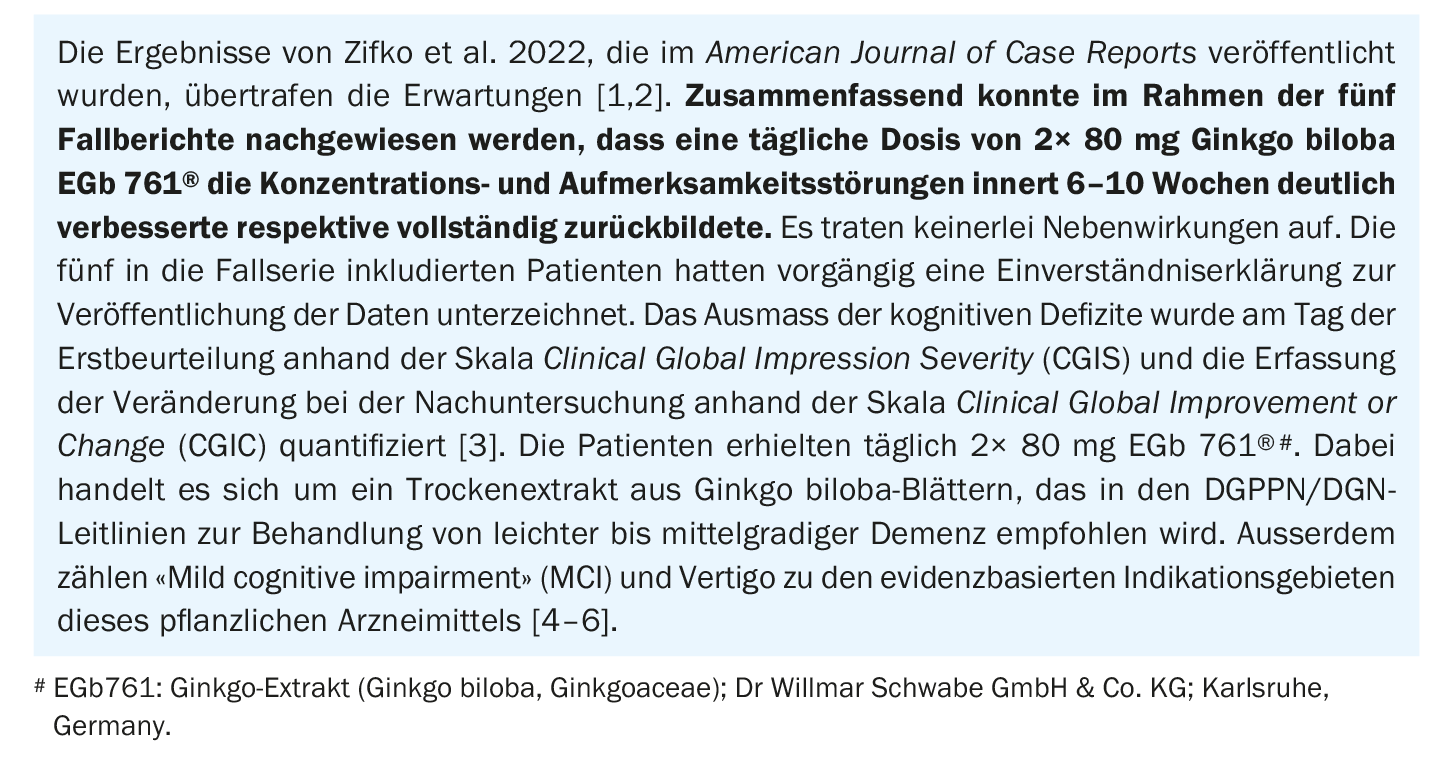
Case 2: 26-year-old woman
A doctor of law suffered a moderate course of Covid-19 in December 2020 [1].
Symptomatology: The patient had fever (38°C) for 3-4 days and body aches, circulatory problems and general weakness for 14 days. She had not been vaccinated at that time. Symptomatic treatment with antipyretic and analgesic drugs was performed at home. However, she had persistent fatigue symptoms and attention deficit disorder (CGIS 4/7), as well as a transient exacerbation of previously known migraine symptoms between March and June 2021. The attention deficits caused her problems especially in her daily professional activities as a lawyer. On August 20, 2021, the patient presented to the outpatient clinic for the first time. Neurologic status also showed hyposmia. Otherwise, no objective abnormalities were detected. The MoCA score was 30.
Therapeutic course: After administration of 2× 80 mg EGb 761® in combination with 2× 500 mg/d ascorbic acid starting on August 21, 2021, there was already a significant improvement in the ability to concentrate and a decrease in fatigue on October 9, 2021. The MoCA score remained unchanged at its peak of 30. At a 3-month telephone follow-up (January 8, 2022), the concentration disturbances had completely resolved (CGIC 1), and the drug was found to be well tolerated.
Case 3: 32-year-old woman
The patient, who had a bachelor’s degree in Arabic linguistics, developed mild Covid 19 infection in February 2021 [1].
Symptomatology: In addition to tension headache and fatigue, the patient initially suffered from dull muscle pain and night sweats within the first two days, which was treated at home. She had not received vaccination against SARS-CoV-2. On clinical neurological examination on July 21, 2021, she was found to have preexisting left Horner syndrome and brachial plexus weakness. Concentration and attention deficits were significant (CGIS 4/7). The authors mention that the patient had not worked during the Covid infection.
Course of therapy: An MRI of the brain was unremarkable and the result of the MoCA test was 29 points. The repetition of five words after a pause of one minute resulted in one missing word. The patient started 2× 80 mg EGb 761® daily on July 22, 2021. At follow-up in November 2021, significant improvement in cognitive deficits was documented (CGIC 5). The MoCA score increased to a value of 30. No adverse events were reported.
Case 4: 26-year-old woman
The woman, who worked as a freelance journalist, had received mRNA SARS-CoV-2 vaccination in June 2021, and became infected with SARS-CoV-2 in July 2021 (before a planned second vaccination), showing a moderately severe course of disease [1].
Symptomatology: The patient suffered from hoarseness, difficulty swallowing, some shortness of breath and cough, and severe fatigue. She presented at our outpatient clinic on September 10, 2021. In addition to arterial hypotension with circulatory disturbances, positional tremor, and autonomic dysfunction, the patient suffered primarily from cognitive deficits with impaired concentration and attention and rapid fatigability. The CGIS value was 4/7. Prior to Covid-19 infection, the patient had been treated for depression with sertraline 50 mg 1-0-0, to which she had responded well. This treatment was continued throughout the observation period.
Clinical neurological status was unremarkable. However, neuropsychological testing with the MoCA yielded 24 points, which is below the recommended cut-off [32]. It scored 3/5 points in the watch test. The patient was unable to perform her work and also requested assistance with daily activities at home, such as shopping and cooking.
Course of therapy: The patient received symptomatic therapy for orthostatic dysregulation (3× 7 drops of midodrine hydrochloride/d ≈ 183 mg/d) in addition to 2× 80 mg/d of EGb 761®. At follow-up on November 29, 2021, the MoCA score had improved to 28 points, and there was significant improvement in impaired concentration and reduction in fatigue, with no adverse effects as defined by the CGIC rating (score of 5).
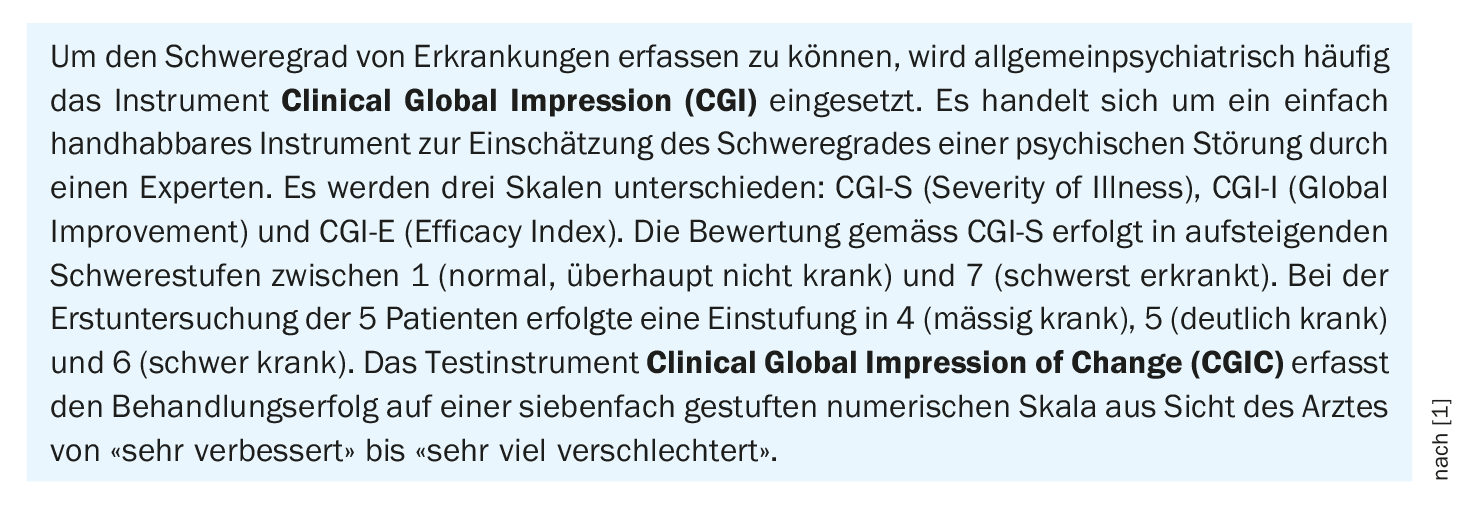
Case 5: 59-year-old man
The commercial artist had a severe course of Covid-19 in March 2021 [1].
Symptomatology: The patient had a fever over 38°C for a period of two weeks and marked shortness of breath with generalized muscle weakness for several weeks. Ventilation was not required, and the patient was treated at home. He had not been vaccinated against SARS-CoV-2. Post-Covid 19 symptoms persisted until baseline on July 14, 2021. At that time, he had moderate depression, fatigue, low-threshold irritability, and cognitive deficits that interfered with his occupational activities, and his CGIS was 4/7. Neurologic status showed hyposmia with otherwise unremarkable findings. The MoCA value was 30 and the DemTect value was 18.
Course of therapy: At baseline, pure antidepressant therapy with 20 mg escitalopram/day and an herbal preparation in the evening to promote sleep-1 capsule/d, with extracts of lemon balm, hops, valerian root, and passionflower-were administered. At the first follow-up after six weeks, significant improvement in depressive episode, fatigue, irritability, and odor disturbance was noted. However, the cognitive and attention deficits remained unchanged. Therefore, vitamin C (2× 500 mg/d) and 2× 80 mg/d EGb 761® were prescribed in addition to continued antidepressant therapy. At another follow-up visit six weeks later, his mood remained stable, and his cognitive deficits had improved almost completely, with no side effects.
Literature:
- Zifko UA, et al: Alleviation of Post-COVID-19 Cognitive Deficits by Treatment with EGb 761®: A Case Series. Am J Case Rep 2022 Sep 26; 23:e937094.
- “Brain Fog: Natural Substance Gives Hope at Long Covid, www.ekhwien.at/abteilungen/medizin/ambulanz/neuro-covid-ambulanz/long-covid-ginko-biloba,(last accessed Dec. 16, 2022).
- Guy W: CGI Clinical Global Impressions. In: Guy W, editor. ECDEU assessment manual for psychopharmacology. Rockville, Md: U.S. Dept. of Health, Education, and Welfare; 1976. pp. 217-222.
- Drug Compendium, https://compendium.ch,(last accessed Dec. 16, 2022).
- DGPPN/DGN: S3 guideline “Dementias,” 2016, long version. www. dgppn.de (last accessed Dec. 16, 2022).
- Băjenaru O, et al.: Effectiveness and Safety Profile of Ginkgo Biloba Standardized Extract (EGb 761®) in Patients with Amnestic Mild Cognitive Impairment. CNS Neurol Disord Drug Targets. 2021, Feb 8, (online ahead of print), doi: 10.2174/1871527320666210208125524.
HAUSARZT PRAXIS 2023; 18(1): 43-45








